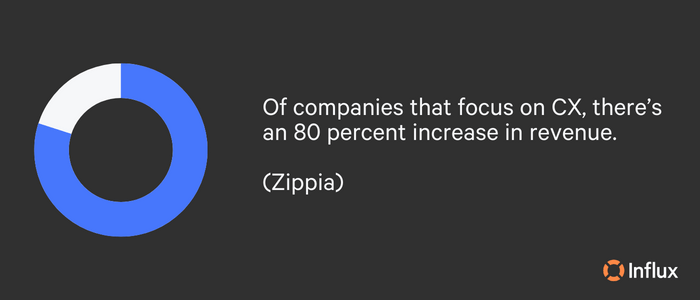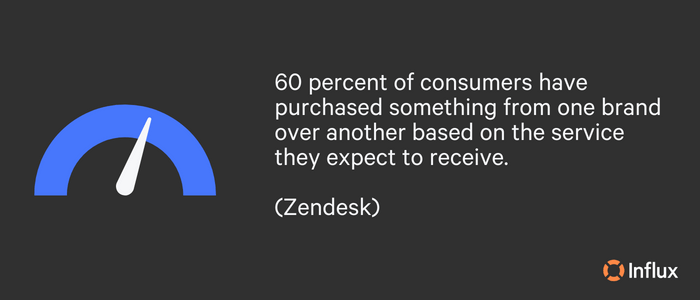
Blog > Cx excellence
Adapting to consumer demand for great CX
Influx support agents are experts at nurturing customer relationships. Keep up with changing demands and stay relevant with top-tiercustomer support!
Consumer demand is constantly changing. However, there are two common expectations that a business needs to satisfy when it comes to its customers: immediate gratification and tailored experiences. Building a meaningful relationship with new and existing customers means meeting those expectations, anticipating their needs, and adapting to their demands.
Ensure your customer support meets expectations and learn how to adapt to consumer demand to improve customer experience (CX) and keep your customers satisfied.

What is consumer demand?
Consumer demand is an economic measure of a group's desire for a product or service depending on availability. It depicts consumer purchase behaviors and aids in determining purchasing trends for specific demographics. While selling products or services, businesses utilize customer demand predictions and statistics to analyze their price, revenues, and strategy. Meeting consumer demands involves listening to customer frustrations, opinions, and suggestions to continue offering them the best experience possible.
Factors that influence the demand for consumer goods
One of the most fundamental notions in economics is the law of demand. It works in tandem with the law of supply to explain how market economies allocate resources and set prices for products and services that we see in everyday interactions.
The law of demand states that as prices rise, demand drops, and vice versa. However, demand for consumer goods can change even when prices are stable. The need for a product increases or decreases depending on several factors:
- Price of product: Higher prices create lower demand, and lower prices generate higher demand.
- Tastes and preferences: Consumer preferences are subjective individual tastes, likes and dislikes, and predispositions. If a health study is published saying something is harmful to your health, this could decrease the demand for that product.
- Consumer expectations: It can be challenging to predict consumer expectations. Consumer expectations can cause people to demand either more or less of a good.
- Availability of substitutes: How a product compares to competitor products factors into consumer preferences.
- Consumer income: Wage increases are the most crucial element in promoting consumer spending. Inflation can also have an impact on expenditure. If inflation outpaces wages, consumers will see a fall in disposable income.
- Number of consumers: Demand is determined by how many people buy a particular product.
Numerous factors can influence consumer demand, ranging from economic and social factors to psychological and environmental factors. As a result, it's essential for businesses to carefully consider and understand these different factors to effectively market their goods to meet the needs and wants of their target consumers.

Why is it essential to adapt to customer needs?
Examining customers' needs provides substantial clues about what a business may need to adjust to survive. Adapting to meet consumer demand is crucial because it helps companies stay competitive, keep their customers happy, and build long-term relationships with them.
How to adapt to customer needs?
Here are a few strategies businesses can use to stay agile and responsive to changing customer needs:
1. Conduct regular customer and market research
Regularly conducting research allows a company to predict what customers might want, to make sure there is demand for a product before launching, and to figure out how to price products appropriately. Research also shows any improvements that can be made to increase the value of a product or service.
Businesses can stay ahead by conducting regular research to understand their customers' preferences, pain points, and expectations. This can involve using surveys, focus groups, customer feedback, and social media monitoring to gather insights.
2. Focus on the customer experience
There are many ways to stand out from the competition and meet customer expectations, but to make a difference, companies need to invest in the customer experience (CX) for a lasting impression. The difference between a company and its competition could lie in the small yet important details that make interacting with a company a pleasure. What does enhancing CX mean? Let's take a look at an example.
A Starbucks barista discovered that one of their regulars, who is deaf, was having difficulty ordering and navigating the Starbucks customer journey. In her leisure time, the team member studied American Sign Language (ASL) to improve the customer's experience. When the customer came in to pick up their usual order, the barista informed him by writing him a note, which affected him so profoundly that he had it framed.
You may not be able to give this type of experience to each customer, but it is a perfect example of caring about the customer enough to adapt and personalize interactions to their needs.

3. Embrace a customer-centric approach
A customer-centric organization aims to please customers at every touchpoint of the customer journey. When the goal is to meet customer demands, keeping consumers at the forefront of decision-making allows teams to pivot or provide advanced solutions that will solve persistent problems. Meeting consumer demands should be a company-wide effort.
4. Deliver top-tier customer support
80% of consumers say that speed, convenience, knowledgeable help, and friendly service are crucial for a positive customer experience. (PWC) While some aspects of your business may change as needed, customer support should always be consistent and exceptional. Despite what's happening in the world or the market, if your customer support goes above and beyond what is expected, consumers will remain loyal to your business.
Customer support is our specialty. We aim to provide the best customer support outsourcing, so our clients can continue to focus their energy on other important aspects of their business. It's why we make customer support affordable and extraordinary for companies of all sizes. Adapting to consumer demand means keeping customers satisfied, and our expert support agents can do just that. Offer top-tier customer support and get a quote now!
5. Make and announce changes based on customer feedback
Collecting customer feedback then requires acting on that feedback. In gathering feedback, identify any commonalities. Then, create a strategy to address those frustrations with tested, innovative solutions.
Be sure to spread the word about your new changes to show that you've been listening and are taking action. Whether this is on social media, your website, or a well-planned newsletter, the medium matters less than the message. Share changes any way that you know your customers – especially the ones who have shared the feedback – will see it. Your customers will feel seen and appreciate that you're genuinely committed to meeting their expectations.
By implementing these strategies, businesses can stay ahead of shifting customer needs and remain competitive in today's rapidly changing business landscape.

Stay agile with distinguished customer support
Influx support agents are experts at nurturing customer relationships and turning one-time purchasers into loyal customers. We deliver fast, high-quality support at scale to consistently meet customer expectations. Our agents are trained in your brand voice to seamlessly integrate with your current operations and increase the quality of support.
We would love to answer any questions you may have about our process. Meet your customer demands and level up your operations with Influx. Find out more!

 6 Circle - small.png)